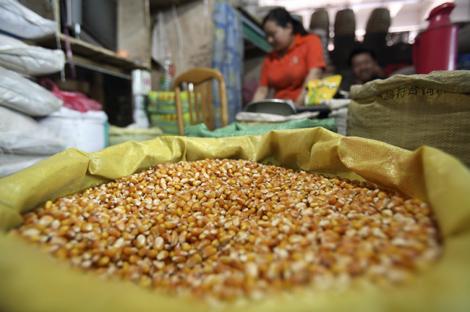
A vendor stands near a sack of corn at a wholesale market in Shanghai. [Bloomberg]
Govt unveils penalties for hoarding of farm produce
BEIJING: China may impose fines of up to 2 million yuan ($295,300) for price manipulation and hoarding of agricultural products, the National Development and Reform Commission said on Wednesday.
Prices of agriculture products such as mung beans and garlic hit the roof in recent months. Some electronic trading markets have supplied a platform for speculation and affected the normal prices on the spot market.
The government's new rules may help private investors like Yu Kaiyu avoid more tragedies. Yu suffered losses due to what he thinks were irregularities on the electronic market.
Yu, a laid-off worker in Anshan, Liaoning province, started trading black tea on the Shanghai Staple Agricultural Products Market, an e-commerce platform for products that includes Pu'er tea, six months ago.
The e-commerce platform adopts a mixed business model between forward and spot trading. Investors usually sign a four- or six-month contract with the market, but they can either settle their trade immediately like spot trading or complete the trading when the contract is due.
Prices of Pu'er tea soared after a once-in-a-century drought hit Yunnan, the only area where it is grown, earlier this year.
What surprised Yu was that the price of Pu'er's went in the opposite direction on the Shanghai electronic market.
In mid-June, the average market price of Pu'er was about 43 yuan per cake, but has since dropped to 31 yuan per cake.
In line with the market's rules, Yu asked to get the tea when his contract expired, but he was informed that private investors with "small" trading volume were not allowed to do so.
Including transaction fees and commission, Yu said he lost all his savings, about 40,000 yuan.
"It's actually like an electronic casino," Yu said. "Many big speculative transactions pulled down the prices since March."
"We suspect that the market got involved in transactions by using virtual money to depress prices and deliberately trapping investors," said Yu and another investor Wang Xianfeng.
Fei Jian, president of the market, was not available for comment.
A local government source said the electronic market used the same account to manage its investors' money and the company's money, part of which is used for purchasing bank-financing products.
China has dozens of agricultural product trading platforms, owned by local governments or private concerns.
Due to a lack of supervision, these electronic platforms may now be used in ways counter to their initial purpose of helping farmers share national demand and supply information in a timely manner, Wang said.
Some electronic markets have failed to act as independent third parties and have become involved in the transactions or even used investors' money for other purposes.
"Owners of the electronic markets can't act like referees and players as the same time, said Wang Yuanhong, an economist of the State Information Center.
Markets will be more cautious about intervening thanks to the government's new rules, he said.





